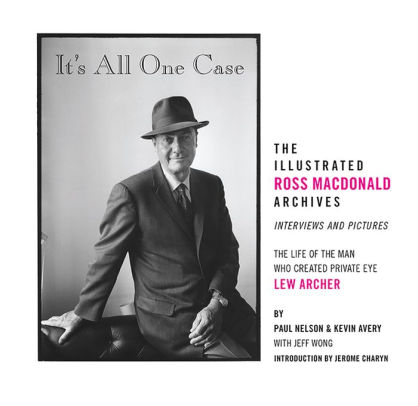In 1976 rock critic Paul Nelson taped 40 or more hours of interviews with Ross Macdonald (Kenneth Millar) with a Rolling Stone article and eventual book in mind. When Nelson died in 2006 neither had been written, but the interviews now have been topically and thematically organized by Nelson biographer Kevin Avery. They are accompanied in this handsome coffee-table book by copious photographs, manuscripts, typescripts, letters, and color reproductions of book and magazine covers, most from the collection of graphic designer and Macdonald enthusiast Jeff Wong.
Nelson, a brilliant journalist and interviewer, was well prepared with specific questions for a subject not interested in small talk. Macdonald, who thought before he spoke and replied in complete sentences, is consistently insightful, serious, challenging, and articulate in his responses. The conversations, augmented by Avery’s footnotes, cover nearly all aspects of Millar/Macdonald’s life and work, including his opinions of other writers, environmental concerns, and attitude toward religion. (“I think that religion is like a forest fire, which just simply has to be not put out but kept under control.”) Closest to a taboo topic is the life and death of his daughter Linda, who is mostly referenced in captions and photographs. At one point, when her name comes up, Macdonald asks the interviewer to shut off the recorder; when the recording resumes, no more is said about her.
The 30 chapters extend from Beginnings and First Works to California and Beyond Archer. Among the topics in between: jazz, detective fiction, romanticism, critics and criticism, Hollywood, painters and other artists. Some chapters focus on groups of works, a few on individual book titles (The Instant Enemy, The Doomsters, The Blue Hammer). Though a number of other writers are discussed at length (including Ernest Hemingway, Norman Mailer, and Marshall McLuhan), only three have a chapter to themselves (seven pages on Hammett, two on Chandler, three on Fitzgerald). Macdonald’s constant reference to the centrality of structure in his writing methods shows his respect for classical detective fiction plotting and may explain why Anthony Boucher believed him a greater novelist than Hammett or Chandler. While Macdonald revered Hammett, he believed Chandler neglected structure and “didn’t take the form as seriously as he should have.”
The interviews were made after the publication of The Blue Hammer, Macdonald’s last novel, in which uncharacteristic errors (some of them corrected for later editions) suggested he was already in the early stages of Alzheimer’s. At one point, struggling to recall a detail from his favorite book, The Great Gatsby, Macdonald says, “Excuse me, sometimes I have a hard time remembering my name,” but indications of his failing powers are rare.



